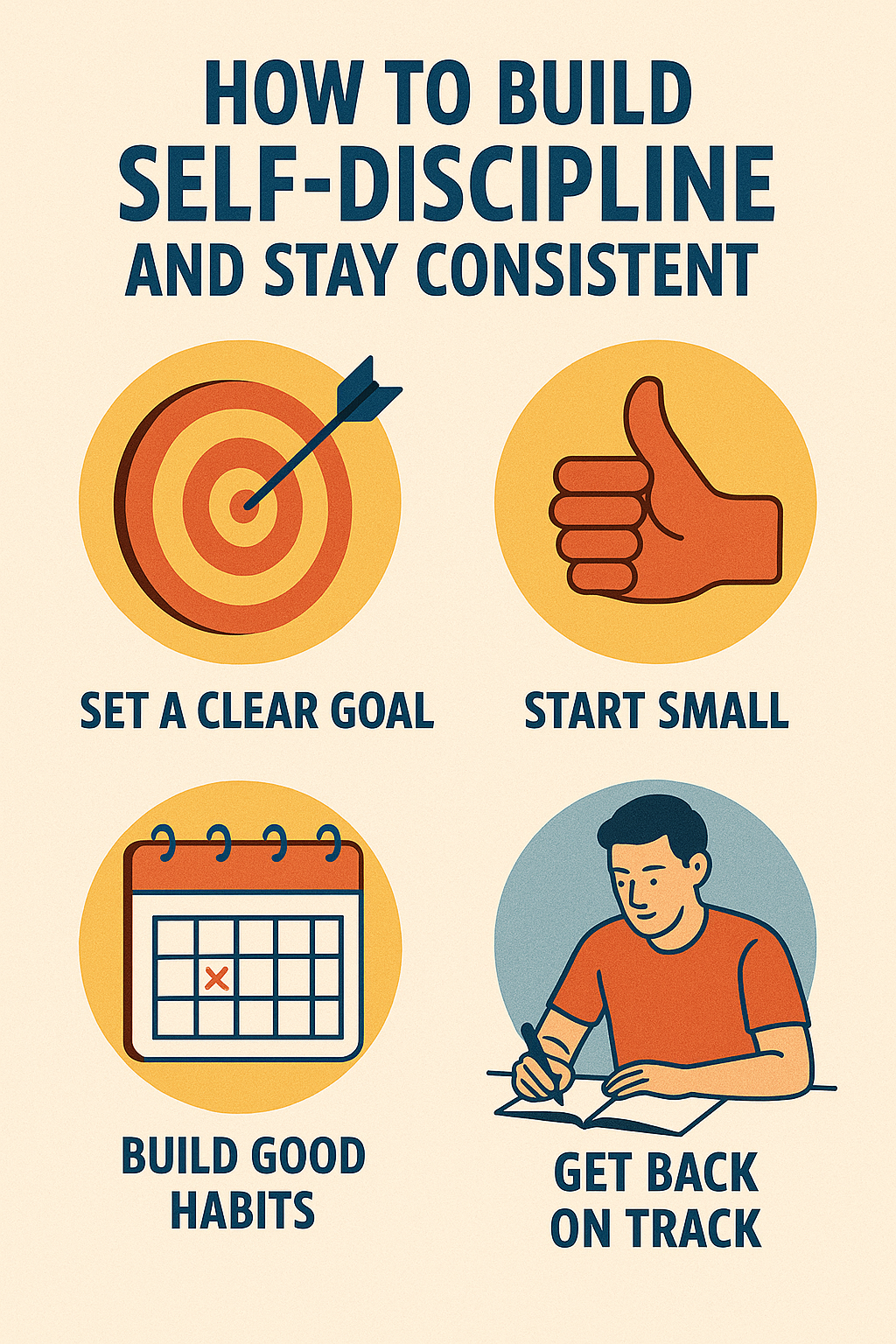Self-discipline is a critical skill for achieving long-term success. It’s the ability to stay focused, follow through on tasks, and make decisions that align with your goals, even when it’s difficult. Self-discipline is not something you’re born with, it’s a habit that can be developed over time. In this article, we’ll explore strategies for building self-discipline and staying consistent in your pursuit of your goals.
1. Set Clear and Specific Goals
The foundation of self-discipline is having clear, specific goals. When you know exactly what you want to achieve, it’s easier to stay focused and motivated. Vague goals, on the other hand, can lead to procrastination and a lack of direction.
Tip: Break your goals down into smaller, specific, and achievable tasks. Having a clear roadmap will make it easier to take action and stay disciplined.
2. Create a Plan and Stick to It
Building self-discipline requires a plan. Once you’ve set your goals, create a detailed plan outlining the steps you need to take to achieve them. A well-structured plan provides guidance and reduces the chances of getting distracted or overwhelmed by uncertainty.
Tip: Create a daily or weekly schedule that allocates time for each task related to your goal. Stick to your plan, and make adjustments as needed to stay on track.
3. Start with Small, Manageable Tasks
Starting with small, manageable tasks can help build momentum and make larger tasks feel less daunting. When you begin with small wins, you feel accomplished and motivated to tackle more challenging tasks.
Tip: Begin your day by completing a simple task that takes little time. This helps you get into a productive mindset and makes it easier to tackle bigger tasks.
4. Develop Positive Habits
Self-discipline is often about building good habits that support your goals. Habits are automatic behaviors that don’t require much mental effort, making them a powerful tool for consistency. By developing positive habits, you create a routine that keeps you on track without needing constant willpower.
Tip: Identify one or two small habits that will help you stay disciplined (e.g., exercising every morning, writing daily, or planning your day the night before). Practice these habits until they become automatic.
5. Eliminate Temptations and Distractions
Distractions and temptations are the enemies of self-discipline. Whether it’s social media, TV, or personal issues, distractions can derail your progress and break your focus. To build self-discipline, it’s important to minimize distractions and create an environment that supports your goals.
Tip: Identify the things that distract you and take proactive steps to eliminate them. For example, turn off phone notifications, use website blockers, or designate a quiet space for work.
6. Practice Delayed Gratification
Self-discipline often involves delaying immediate gratification for long-term rewards. It’s easy to indulge in short-term pleasures, but these can prevent you from reaching your bigger goals. Learning to delay gratification strengthens your self-control and helps you stay consistent.
Tip: When you feel the urge to give in to a distraction or indulgence, remind yourself of your long-term goal. Visualize how achieving your goal will feel, and use that as motivation to stay disciplined.
7. Use Positive Reinforcement
Rewarding yourself for staying disciplined is a great way to reinforce good behavior. Positive reinforcement creates a positive feedback loop that motivates you to continue practicing self-discipline. Celebrate your small victories and use rewards as incentives to stay consistent.
Tip: Set up a reward system for yourself. After completing a major task or reaching a milestone, treat yourself to something you enjoy, like a favorite meal, a break, or a fun activity.
8. Stay Accountable to Yourself and Others
Accountability is a powerful tool for building self-discipline. When you hold yourself accountable to your goals, you’re more likely to stay focused and motivated. You can also share your goals with someone else to add an extra layer of accountability.
Tip: Write down your goals and track your progress regularly. If possible, share your goals with a trusted friend or mentor who can check in and provide support.
9. Be Patient with Yourself
Building self-discipline takes time, and setbacks are inevitable. It’s important to be patient with yourself and not get discouraged when things don’t go according to plan. Instead of focusing on mistakes, focus on what you can learn from them and keep moving forward.
Tip: When you slip up, don’t be too hard on yourself. Acknowledge the setback, learn from it, and recommit to your goals. Patience and persistence are key to building lasting self-discipline.
10. Stay Focused on the Long-Term Benefits
Self-discipline is about making choices that benefit you in the long term. While it’s tempting to seek instant gratification, staying focused on your long-term goals will help you maintain consistency and motivation. Visualize the positive impact your self-discipline will have on your future success.
Tip: Regularly remind yourself of the bigger picture. When faced with temptation or difficulty, focus on the long-term benefits of staying disciplined and working toward your goal.
